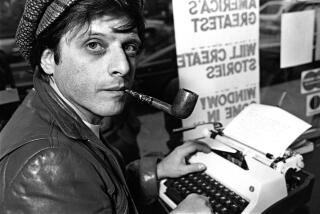THE HOTEL EDEN: Stories.<i> By Ron Carlson</i> .<i> W. W. Norton: 224 pp., $23</i>
Ron Carlson’s “The Hotel Eden” is a strange eclectic mixture of some of the funniest and saddest stories ever to cozy up together in one volume. Some stories are brilliant and deeply moving; others are wild and surreal. Taken together, they represent the idiosyncratic vision of an original writer who does what only good writers can do: make us see and feel what his characters see and feel and draw us into their world as if we had been born there.
From the “torn edge of the known world,” to use one of Carlson’s many memorable phrases, come these stories of yearners and bumblers and gamblers, caught up in moments “gone strange.” The book is divided into three sections, each with its own epigraph. There’s a symmetry to this: By being grouped, the stories in each section play off of each other, echoing certain themes and reinforcing the sense of a unified vision.
“Let me make this kind of mistake with you, let me tell you everything,” states the epigraph that opens the first section, a cluster of five stories about disillusionment and bittersweet love. The two strongest stories in this section, “The Hotel Eden” and “The Prisoner of Bluestone,” end up telling, if not everything, then enough to make us feel we know the deepest secrets of the two male protagonists, whose longings take on an almost physical gravity.
In “The Hotel Eden,” Mark is spending a year in London with his girlfriend Allison when they meet an older character named Porter who charms them with his wit, bravura and worldliness. Night after night, these two young Americans full of a yearning for life meet in the bar of the Hotel Eden to listen to Porter’s stories. As Mark confesses: “I wanted with all my teeth for something to claim me,” but when Porter betrays him by seducing Allison, what is claimed is Mark’s youthful innocence.
Rucklebar, the gas station owner in “The Prisoner of Bluestone,” has seen his life and his family slip away from him. What he’s really the prisoner of is his own passivity and his wife’s and daughter’s open hostility. But when he connects emotionally with a boy whose sister has been killed in an automobile accident, he finds the strength to finally act, and the story ends on a note of redemption.
These stories give us not the truth about the world and about how things come about but rather brief snapshots of people making a separate peace with themselves in the midst of rejection and disappointment. Rucklebar’s “heart heaves” because “he knows about this, about living in his silent house where a kind word would have broken him.” Keith, the protagonist of the story of the same name, knows much the same thing. He’s a high school boy dying of cancer, an oddball and outsider who manages to win over Barbara, his popular chemistry lab-mate, and forever transform both of their lives in the process.
The seriousness and emotional weight of these stories give way in the second part of the collection to the zaniness of stories like “What We Wanted to Do,” an account of an attempt by a group of medieval villagers to protect themselves from marauding Visigoths (and “Minigoths,” “Maxigoths”) by inventing a contraption that will enable them to pour boiling oil onto the heads of their enemies. The problem is, nobody knows exactly when to light the fire to get the oil boiling, and when the enemy is finally doused with warm sticky oil, they launch an even more virulent attack. It’s a hilarious story, one that can be read as allegory as well as simply a tall tale.
You can laugh out loud at these stories, as I did many times, and then a few minutes later find yourself deeply moved by a character’s pathos. It’s fair to say that this is the normal state of affairs in Carlson’s literary universe. In his previous story collection, “Plan B for the Middle-Class,” and his novel “Betrayed by F. Scott Fitzgerald,” Carlson evokes similar emotional extremes, but here he manages to make it all seem wonderfully fresh, and we feel as if we’ve never encountered a mixture quite like this.
His sense of landscape, the way he evokes a rain-sodden desert town or a star-shot Western night, lends a vividness to the prose. I’ve always thought of him as a true Western writer (he lives and teaches in Arizona), so I was surprised to find a number of these stories set in New England, proving he can’t be typed as a regional writer.
In the end, there’s something all-American about this author’s work, and no story demonstrates this better than “Oxygen,” the last in the collection. A college student lands a summer job delivering oxygen tanks to the sick and dying in the suburbs of Phoenix. He’s recently lost his virginity and feels the “animal happiness” of his youth. But, against his wishes, he gets caught up in the sad, wretched orbit of a dying man while at the same time striking up a torrid affair with a customer’s daughter. The themes of sex and death are played out with contrapuntal intensity against a landscape of malls and sterile suburbs and in the process, America--its very essence--is brilliantly captured. One closes the book, and any slight reservation about its eclecticism is wiped away; the variety of the collection is its very strength.
“The Hotel Eden” affirms both the breadth and the depth of this writer’s vision as well as the utter singularity of his voice.
More to Read
Sign up for our Book Club newsletter
Get the latest news, events and more from the Los Angeles Times Book Club, and help us get L.A. reading and talking.
You may occasionally receive promotional content from the Los Angeles Times.









